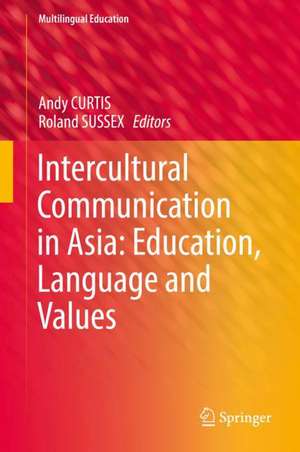Intercultural Communication in Asia: Education, Language and Values: Multilingual Education, cartea 24
Editat de Andy Curtis, Roland Sussexen Limba Engleză Hardback – 20 apr 2018
This volume presents in-depth studies on leading themes in education policy and intercultural communication in contemporary Asia, covering empirical as well as theoretical approaches, and offering both an in-depth investigation of their implications, and a synthesis of areas where these topics cohere and point to advances in description, analysis and theory, policy and applications.
The studies address key questions that are essential to the future of education in an Asia where intercultural communication is ever more important with the rise of the ASEAN Economic Community and other international initiatives. These questions include the properties of the increasing globalisation of communication and how it plays out in Asia, especially but not exclusively with reference to English, and how we can place intercultural communication in this context, as well as studies that highlight intercultural communication and its underlying value systems and ideologiesin Asia.
| Toate formatele și edițiile | Preț | Express |
|---|---|---|
| Paperback (1) | 583.78 lei 6-8 săpt. | |
| Springer International Publishing – 2 feb 2019 | 583.78 lei 6-8 săpt. | |
| Hardback (1) | 787.15 lei 6-8 săpt. | |
| Springer International Publishing – 20 apr 2018 | 787.15 lei 6-8 săpt. |
Din seria Multilingual Education
- 18%
 Preț: 902.36 lei
Preț: 902.36 lei - 18%
 Preț: 956.81 lei
Preț: 956.81 lei - 18%
 Preț: 953.65 lei
Preț: 953.65 lei - 18%
 Preț: 836.29 lei
Preț: 836.29 lei - 15%
 Preț: 638.24 lei
Preț: 638.24 lei - 20%
 Preț: 567.32 lei
Preț: 567.32 lei - 20%
 Preț: 566.76 lei
Preț: 566.76 lei - 20%
 Preț: 569.86 lei
Preț: 569.86 lei - 15%
 Preț: 649.87 lei
Preț: 649.87 lei - 15%
 Preț: 645.28 lei
Preț: 645.28 lei -
 Preț: 394.87 lei
Preț: 394.87 lei - 15%
 Preț: 643.84 lei
Preț: 643.84 lei - 15%
 Preț: 643.34 lei
Preț: 643.34 lei -
 Preț: 389.49 lei
Preț: 389.49 lei - 15%
 Preț: 704.36 lei
Preț: 704.36 lei - 20%
 Preț: 555.53 lei
Preț: 555.53 lei - 18%
 Preț: 953.65 lei
Preț: 953.65 lei - 18%
 Preț: 952.26 lei
Preț: 952.26 lei - 15%
 Preț: 646.43 lei
Preț: 646.43 lei - 15%
 Preț: 585.40 lei
Preț: 585.40 lei - 18%
 Preț: 1009.22 lei
Preț: 1009.22 lei - 18%
 Preț: 948.92 lei
Preț: 948.92 lei - 15%
 Preț: 649.22 lei
Preț: 649.22 lei - 18%
 Preț: 1113.39 lei
Preț: 1113.39 lei - 15%
 Preț: 644.95 lei
Preț: 644.95 lei - 15%
 Preț: 634.68 lei
Preț: 634.68 lei - 15%
 Preț: 644.63 lei
Preț: 644.63 lei -
 Preț: 388.90 lei
Preț: 388.90 lei - 15%
 Preț: 647.27 lei
Preț: 647.27 lei - 15%
 Preț: 641.85 lei
Preț: 641.85 lei - 15%
 Preț: 635.80 lei
Preț: 635.80 lei
Preț: 787.15 lei
Preț vechi: 959.94 lei
-18% Nou
Puncte Express: 1181
Preț estimativ în valută:
150.64€ • 156.69$ • 124.36£
150.64€ • 156.69$ • 124.36£
Carte tipărită la comandă
Livrare economică 15-29 aprilie
Preluare comenzi: 021 569.72.76
Specificații
ISBN-13: 9783319699943
ISBN-10: 3319699946
Pagini: 230
Ilustrații: XII, 280 p. 40 illus.
Dimensiuni: 155 x 235 x 22 mm
Greutate: 0.59 kg
Ediția:1st ed. 2018
Editura: Springer International Publishing
Colecția Springer
Seria Multilingual Education
Locul publicării:Cham, Switzerland
ISBN-10: 3319699946
Pagini: 230
Ilustrații: XII, 280 p. 40 illus.
Dimensiuni: 155 x 235 x 22 mm
Greutate: 0.59 kg
Ediția:1st ed. 2018
Editura: Springer International Publishing
Colecția Springer
Seria Multilingual Education
Locul publicării:Cham, Switzerland
Cuprins
Introduction, Roland SUSSEX and Andy CURTIS.- Part I: Models, Intercultural Competence and Education.- Individual, Institutional and International: Three Aspects of Intercultural Communication, Andy CURTIS.- Toward a Critical Epistemology for Learning Languages and Cultures in 21st Century Asia, Andrew LIAN and Roland SUSSEX.- Intercultural Communication in English Courses in Asia: What Should we Teach About? Don SNOW.- Part II: Values and Communication in Cultural Contexts.- Confucian Values as Challenges for Communication in Intercultural Workplace Contexts: Evidence from the Motivational Concerns in Vietnamese Politeness Behaviour, PHAM Thi Hong Nhung.- Part III: English as a Lingua Franca and in Inter/intra-cultural Communication.- The impact of English as a Global Lingua Franca on Intercultural Communication, Juliane HOUSE.- How does Intercultural Communication differ from Intracultural Communication? Istvan KECSKES.- Part IV: Focal areas of Intercultural Communication.- Reading the city: The Lnguistic and Semiotic Landscape of Macao’s San Ma Lo (新馬路), Joanna RADWAŃSKA-WILLIAMS.- Intercultural Communication about pain, Roland SUSSEX.- Functions of Humor in Intercultural Communication and Educational Environments, Kimie OSHIMA.- Part V: Identity.- Emotional Branding on Social Media: A Cross-cultural Discourse Analysis of Global brands on Twitter and Weibo, Doreen D. WU and Chaoyuan LI.- China’s Fluctuating English Education Policy Discourses and Continuing Ambivalences in Identity Construction, GAO Yihong.- Conclusion, Roland SUSSEX and Andy CURTIS.
Textul de pe ultima copertă
This volume presents in-depth studies on leading themes in education policy and intercultural communication in contemporary Asia, covering empirical as well as theoretical approaches, and offering both an in-depth investigation of their implications, and a synthesis of areas where these topics cohere and point to advances in description, analysis and theory, policy and applications. The studies address key questions that are essential to the future of education in an Asia where intercultural communication is ever more important with the rise of the ASEAN Economic Community and other international initiatives. These questions include the properties of the increasing globalisation of communication and how it plays out in Asia, especially but not exclusively with reference to English, and how we can place intercultural communication in this context, as well as studies that highlight intercultural communication and its underlying value systems and ideologies in Asia.
Caracteristici
In-depth studies on key questions in intercultural communication in Asia, covering education policy and implications Offers models for intercultural competence in English language courses Theoretical approaches as well as data-rich analysis that covers a wide range of countries, topics, and interdisciplinary areas
